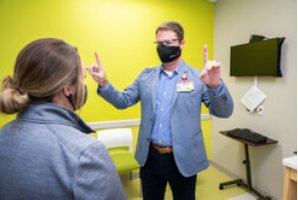Knell G, Caze T, Burkhart SO. Evaluation of the vestibular and ocular motor screening (VOMS) as a prognostic tool for protracted recovery following paediatric sports-related concussion. BMJ Open Sport & Exercise Medicine 2021;7:e000970. doi:10.1136/ bmjsem-2020-000970.
The full paper can be found here
Tell us more about yourself and the author team
I am an epidemiologist with an interest and training in physical activity epidemiology. This means I study how physical activity impacts human health, in both good and bad ways (injuries). I have recently begun to collaborate with a group of clinicians to study sport-related concussions in pediatric populations. This includes Dr Scott Burkhart, a neuropsychologist with speciality training in the treatment and management of sport-related concussion in pediatric populations. Dr Burkart directs the pediatric concussion clinic at the Children’s Health Andrews Institute for Orthopaedics and Sports Medicine (where all the data for this analysis were collected). I hold a joint appointment at the Andrews Institute, and my primary appointment is in the Children’s Health/UTHealth Center for Pediatric Population Health.
What is the story behind your study?
Burkhart has always sought to advance the science in the Andrews Institute concussion clinic by integrating various clinical measures that inform the diagnosis and treatment/management of concussion. This includes assessing all patients with tools that have not been traditionally used in clinical settings, including the Vestibular-Ocular Motor Screening (VOMS) tool. The VOMS has been found to be sensitive enough to be able to identify concussion patients that have disruptions to their vestibular-ocular system – which has been shown to be related to recovery time. Identifying how long a patient will take to recover from a concussion has important clinical implications – we are able to then develop a treatment plan that is more aligned with the predicted recovery trajectory. This can result in better treatments for both the patient and the clinic (reduced cost). So, we sought to specifically evaluate the VOMS in this context – as a tool to predict recovery time and identify those that may take longer to recover.

In your own words, what did you find?
We found that the VOMS test overall, and most elements of the VOMS test, were associated with recovery time. So, at a minimum, the VOMS is sensitive to disruptions to the vestibular-ocular system in pediatric concussion patients, and these disruptions appear to be related to how long a patient takes to recover from a concussion. However, when we evaluated the VOMS as a tool to screen or identify those patients that will have a clearly defined longer recovery (>30-days) the VOMS tool failed. This may mean that although the VOMS is related to recovery time, it is not sufficient as a stand-alone tool to accurately flag those patients that will have delayed recovery.
What was the main challenge you faced in your study?
Although the VOMS is an easy to use clinical measure, it is a relatively complex tool to analyze statistically. The VOMS creates a data matrix table that is 4 columns wide, but 8 rows long. However, in an effort to unlock some of the data within that 4×8 table, we calculated over 70 unique data points, thereby increasing the complexity of the data. This created some challenges, but we were able to overcome them and feel we made sense of the findings.
If there is one take-home message from your study, what would that be?
We would like readers to know that, in our sample, the VOMS is not a sufficient prognostic tool to identify pediatric patients who will have delayed recovery from concussion. But, the VOMS test results are related to recovery time and therefore should be considered as part of a larger battery of tests that may be useful in identifying patients that may take longer to recover from a concussion.
If there is one take-home message from your study, what would that be?
We would like readers to know that, in our sample, the VOMS is not a sufficient prognostic tool to identify pediatric patients who will have delayed recovery from concussion. But, the VOMS test results are related to recovery time and therefore should be considered as part of a larger battery of tests that may be useful in identifying patients that may take longer to recover from a concussion.